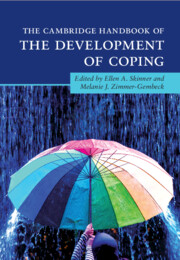Book contents
- The Cambridge Handbook of the Development of Coping
- Cambridge Handbooks in Psychology
- The Cambridge Handbook of the Development of Coping
- Copyright page
- Contents
- Contributors
- Preface
- 1 A Systems Perspective on the Development of Coping
- Part I Theoretical Perspectives on the Development of Coping
- Part II Methods for Studying the Development of Coping
- Part III Neurophysiological and Experiential Bases of the Development of Coping
- Part IV Psychological Foundations of the Development of Coping
- Part V Social Contexts and the Development of Coping
- Part VI Application and the Development of Coping
- 25 Social Media Use and Misuse, Stress, and the Development of Coping
- 26 Clinical Treatments for Child Emotional Disorders and the Development of Coping
- 27 Fostering the Development of Academic Coping
- 28 Youth Programs and the Development of Coping
- Index
- References
27 - Fostering the Development of Academic Coping
A Multi-level Systems Perspective
from Part VI - Application and the Development of Coping
Published online by Cambridge University Press: 22 June 2023
- The Cambridge Handbook of the Development of Coping
- Cambridge Handbooks in Psychology
- The Cambridge Handbook of the Development of Coping
- Copyright page
- Contents
- Contributors
- Preface
- 1 A Systems Perspective on the Development of Coping
- Part I Theoretical Perspectives on the Development of Coping
- Part II Methods for Studying the Development of Coping
- Part III Neurophysiological and Experiential Bases of the Development of Coping
- Part IV Psychological Foundations of the Development of Coping
- Part V Social Contexts and the Development of Coping
- Part VI Application and the Development of Coping
- 25 Social Media Use and Misuse, Stress, and the Development of Coping
- 26 Clinical Treatments for Child Emotional Disorders and the Development of Coping
- 27 Fostering the Development of Academic Coping
- 28 Youth Programs and the Development of Coping
- Index
- References
Summary
Although studies suggest that coping is central to students’ learning and achievement, and open to influence from personal and interpersonal factors, research also paints a troubling picture of normative development: During primary school, students’ coping follows a constructive trajectory, but in early adolescence, maladaptive coping rises abruptly while adaptive strategies decline; and students do not fully recover from these losses by the end of the teenage years. To make sense of these trends, we argue for a systems conceptualization that defines coping as “action regulation under stress,” and embeds action in a larger multi-level coping system. To illustrate the utility of this approach, we explore five ways it can offer insights about how social partners and ecologies can foster the healthy development of students’ academic coping. We hope to contribute to a shift to more developmental and systems-oriented conceptualizations, which we believe can better inform intervention efforts and guide future study of the development of academic coping.
Keywords
Information
- Type
- Chapter
- Information
- The Cambridge Handbook of the Development of Coping , pp. 641 - 679Publisher: Cambridge University PressPrint publication year: 2023
References
Accessibility standard: Unknown
Why this information is here
This section outlines the accessibility features of this content - including support for screen readers, full keyboard navigation and high-contrast display options. This may not be relevant for you.Accessibility Information
- 3
- Cited by
